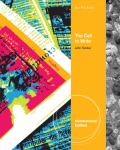
Connecting writing to everyday life, THE CALL TO WRITE, Brief International Edition, continues its long tradition of breaking new ground in composition. Organized by genres, including letters, memoirs, public documents, profiles, reports, commentaries, proposals, and reviews, this innovative rhetoric gives students the practice they need to write both in college and in the public sphere. An emphasis on public writing promotes civic involvement, while relevant, provocative readings help students understand the concept of being "called to write" in response to a personal, community, or societal need. INDICE: Guide to Visual Design. Preface. Part I: WRITING AND READING. Introduction: The Call to Write. Identifying and Responding to the Call to Write. Reflecting on Your Writing. 1. What Is Writing? Analyzing Literacy Events. Writing in Everyday Life. Lists. Keeping a Literacy Log. Writing in the Workplace. FEMA and Katrina. Memo to a Thief. Writing in the Public Sphere. Ethics of Writing: Graffiti. Gallery of Signs. Writing in School. High School Research Paper. College Response Paper. Analyzing a Literacy Event. Frederick Douglass, from "Narrative of the Life of Frederick Douglass". Eudora Welty, from "One Writer's Beginnings". Margaret J. Finders, from "Just Girls: Hidden Literacies and Life in Junior High". Writing Assignment: Analyzing a Literacy Event. 2. Understanding The Rhetorical Situation: The Choices Writers Make. The Rhetorical Situation Writer's Orientation Audience Genre. ACORN Katrina Survivors Association. Case Study: The Somali Pirates. Strategies for Reading First Questions to Ask of Readings. Doing a Close Reading. Underlining. Annotation. Fred C. Inkles, "Kill the Pirates". Summary. Sample Summary of "Kill the Pirates" Describing the Writer's Strategy. Sample Description of a Writer's Strategy. Writing Strategies. Exercise: Doing a Close Reading. Johann Hari, "You Are Being Lied to About Pirates". Ethics of Reading: Boredom and Persistence. Analyzing the Rhetorical Situation: The Somali Pirates Writer's Orientation Audience. Genre. Checklist: Analyzing the Writer's Language. Tone. Denotation/Connotation. Figures of Speech. Stereotypes. Analysis of a Rhetorical Situation. Kevin Powell, "My Culture at the Crossroads". Sample Analysis. Writing Assignment: Analyzingthe Rhetorical Situation. 3. Persuasion And Responsibility: Analyzing Arguments. Working Together: Successful Persuasion. Understanding Argument. What Is Argument? Dealing with Reasonable Differences. Ethics of Writing: The Writer's Responsibility. Darcy Peters and Marcus Boldt: Exchange of Letters. What Do Readers Expect from Arguments? Sample Argument: Katie DiMartile, "Roadside Memorials". Entering a Controversy. Analyzing Issues. Types of Issues. Issues of Substantiation. Issues of Evaluation. Issues of Policy. Sample Exploration of a Controversy. Taking a Position: From Issues to Claims. Developing a PersuasivePosition. What Are the Rhetorical Appeals? Analysis of Persuasive Appeals. Malcolm X, from "The Ballot or the Bullet" Ethos. Pathos. Logos. Constructing anAppropriate Rhetorical Stance. Sample Letters of Application. Working Together: Rhetorical Stance. Making an Argument. What Are the Parts of an Argument? Claims, Evidence, and Enabling Assumptions. Sample Evaluations. Claims. Evidence. Questions to Ask About Evidence. Enabling Assumptions. Sample Interviews. Working Together: Analyzing Claims, Evidence, and Enabling Assumptions. Differing Views 81. Summarize Differing Views Fairly and Accurately. Refuting Differing Views. Conceding Differing Views. Negotiating Differing Views. Qualifiers. Negotiating Differences. Beyond Pro and Con. Dialogue with Others. An Electronic Exchange of Views. Recognizing Ambiguities and Contradictions. Anna Quindlen, "Abortion Is Too Complex To Feel All One Way About". Locating Common Ground. Call for a Moratorium on Executions. Rhetorical Analysis of an Argument. Sample Analysis of the Argument in "Call for a Moratorium on Executions". WritingAssignment: Analyzing an Argument. Part II: WRITING PROJECTS. Introduction: Genres of Writing. Writing and Genre Knowledge. 4. Letters. Thinking About the Genre. Readings. Open Letter. Meth Science Not Stigma: Open Letter to the Media. Letters to the Editor. Mark Patinkin, "Commit a Crime, Suffer the Consequences". Letter from Kristin Tardiff. Letter from John N. Taylor Text Messages. Charles McGrath, "The Pleasures of the Text". Letter of Appeal. Doctors WithoutBorders/Medecins Sans Frontières (MSF). Report: DRC: Treating Victims of War.Letter as Essay. James Baldwin, "My Dungeon Shook: Letter to My Nephew". Ethics of Writing: Using the Internet. Further Exploration: Letters. Rhetorical Analysis. Genre Awareness. Writing Assignment: Letters. Invention. Identifying the Call to Write. Understanding Your Readers. Background Research: Finding Models. Planning. Establishing the Occasion. Arranging Your Material. Working Draft. Beginnings and Endings: Using an Echo Effect. Using Topic Sentences. Peer Commentary. Revising. Strengthening Topic Sentences for Focus and Transition. Writers' Workshop. Michael Brody, Letter to the Editor. Michael Brody's Commentary. Reflecting on Your Writing. 5. Memoirs. Thinking About the Genre. Writing from Experience. Readings. Annie Dillard, from An American Childhood. Dave Marsh, "Fortunate Son". Gail Caldwell, "Teenage Angst in Texas". Audio Memoirs.Story Corps Graphic Memoirs. Marjane Satrapi, from Persepolis. Art Spiegelman, from "In the Shadow of No Towers". Richard Hoffman, "The Ninth Letter of theAlphabet: First-Person Strategies in Nonfiction". Ethics of Writing: Bearing Witness. Further Exploration: Memoirs Rhetorical Analysis Genre Awareness. Writing Assignment: Memoirs. Invention. Past and Present Perspectives. BackgroundResearch: Putting Events in Context. Planning. Arranging Your Material. Selecting Details. Working Draft. Beginnings and Endings: Framing Your Memoir. PeerCommentary. Revising. From Telling to Showing. Writers' Workshop. Jennifer Plante's Commentary. Jennifer Plante, Sunday Afternoons. Reflecting on Your Writing. 6. Public Documents. Thinking About the Genre. Writing from Experience. Readings. Manifestos. Declaration of Independence. First Things First 2000. Encounters with Public Documents. Abraham Verghese, from My Own Country. Ellen Cushman, from The Struggle and the Tools. Petitions. Amnesty International, Callon Kenya to Ease the Suffering of Nairobi's 2 Million Slum Dwellers. Kevin M.Bartoy, "Stimulate the Economy--Forgive Student Loans". Jason Pierc
- ISBN: 978-0-495-90666-7
- Editorial: Heinle & Heinle
- Encuadernacion: Rústica
- Páginas: 672
- Fecha Publicación: 21/03/2010
- Nº Volúmenes: 1
- Idioma: Inglés
